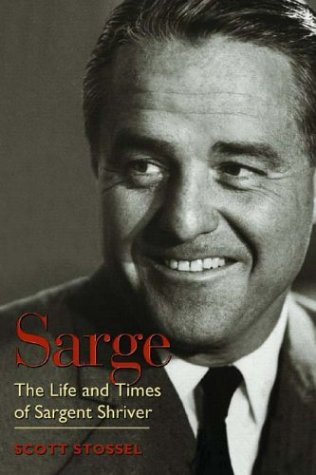
Sarge: Too handsome, famous and well-connected for his own reputation
New Frontiersman
Too handsome, famous and well-connected for his own reputation.
By Reviewed by David Kusnet
Sunday, May 23, 2004; Page BW03
SARGE
The Life and Times of Sargent Shriver
By Scott Stossel. Smithsonian. 761 pp. $32.50.
At the age of 88 and suffering from the early stages of Alzheimer's, R. Sargent Shriver is as well known for being President John F. Kennedy's brother-in-law and California Gov. Arnold Schwarzenegger's father-in-law as he is for being the father of the Peace Corps, Job Corps, Head Start and the Special Olympics.
In spite of his accomplishments, Shriver has often been labeled a "lightweight." His good looks, family connections, aura of celebrity and super-salesmanship all were burdens as well as blessings, conveying the impression that he lacked the political instincts and intellectual capacity to win power on his own and wield it with authority.
In this lengthy but lively biography, the journalist Scott Stossel explains in exhaustive detail how Shriver translated vague mandates to found an international service program and wage war on poverty into the creation of some of the most successful social programs of the past half-century. He fought for the independence of his new agencies, saving them from being swallowed up by existing government bureaucracies. He made sure they would not be merely pilot projects, understanding that only large-scale efforts would capture the public imagination. Thus, he enrolled more than 500,000 children in Head Start during its first summer, so that, as he shrewdly said, "No Congress and no President can ever destroy it."
Long before the label was fashionable, Shriver was a neoliberal skeptic of big government, launching and leading federal agencies that avoided bureaucratic bloat and enlisted the energies of youthful volunteers, community activists and the business community. His approach to government arose out of his religious faith and his experiences in business, civic activism and local government, including service as president of the Chicago Catholic Interracial Council and the city's Board of Education. By the time two successive presidents asked his advice, Shriver had developed ideas about the importance of community action, early childhood education, vocational training for troubled teenagers and opportunities for young people to immerse themselves in the cultures of other countries.
Shriver's public life was also shaped by his family life. In 1946, while wooing Eunice Kennedy, Shriver received a job offer from her father, Joseph P. Kennedy. It evolved into an apprenticeship with a multimillionaire whose machinations rivaled those of Donald Trump today. Shriver would manage the elder Kennedy's Merchandise Mart in Chicago, marry Eunice, work in John F. Kennedy's senatorial and presidential campaigns and assist the Kennedy family's charities. But, Stossel contends, John, Edward and especially Robert Kennedy never fully accepted their brother-in-law as a brother in arms.
Heading the Peace Corps and later the Office of Economic Opportunity from 1961 through 1968, Shriver was caught in the crossfire between Lyndon B. Johnson and the Kennedy family and its allies. Sensing the opportunity to win over one Kennedy, LBJ gave Shriver "the Johnson treatment." When Shriver was creating the Peace Corps, JFK's inner circle wanted to submerge it in the State Department, but LBJ helped Shriver keep it independent.
After Kennedy was assassinated, Johnson reached out to Shriver, who reciprocated, while Robert Kennedy and most of his loyalists were cool to the crude Texan. Thus, Shriver offended some Kennedy family members and supporters who, Stossel writes, vetoed his vice-presidential aspirations in 1964 and 1968.
Stossel exaggerates Shriver's potential as a candidate, maintaining that Hubert H. Humphrey would have won the 1968 presidential election with Shriver as his running-mate. He claims that Shriver would have brought the ticket more "Catholic and ethnic voters," including "a few thousand more votes among the Catholic Poles of Milwaukee." In fact, Humphrey's vice-presidential choice, Maine Senator Edmund Muskie, himself a Catholic of Polish ancestry, ran strongly among blue-collar voters. Four years later, as George McGovern's running mate, Shriver ran a spirited race but was often awkward among working-class voters, famously ordering a Courvoisier in a workingman's bar in Youngstown, Ohio. While Shriver was interested in the inner cities and welcome in rural villages or presidential palaces overseas, he was out of place among workaday Americans and didn't win a single primary when he sought the Democratic presidential nomination in 1976.
He didn't win the White House, but he changed millions of lives. Head Start alone has helped prepare 20 million children to do better in school. Few presidents have accomplished more than the man everyone calls "Sarge." If he was a lightweight or a limousine liberal, we could use many more like him. •
David Kusnet was chief speechwriter for President Bill Clinton from 1992 through 1994. He is a visiting fellow at the Economic Policy Institute and the author of "Speaking American: How the Democrats Can Win in the Nineties."
© 2004 The Washington Post Company
